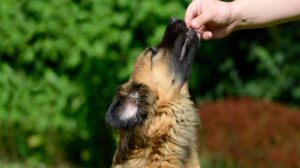
Identifying Symptoms of Concussion in Dogs
Concussions can occur in dogs after a car accident, fall or hard blow to their head. The symptoms of craniocerebral injury can sometimes not be seen until much later. This makes it even more important to know what you should look for and how you can help your dog.
Dogs are generally able to absorb minor impacts. They are protected by their relatively thick skull. A particularly severe blow may cause your dog to have a concussion. The severity of the traumatic injury will determine how easy it is to identify symptoms.
What causes a concussion in dogs?
The skullcap protects the dog’s head, but it is also protected by a fluid called cerebrospinal liquid that surrounds and covers the spinal cord. It is located between the skullcap and the brain.
If you fall or hit your head, the brain can strike the inside of your skull. The brain tissue can be damaged and, in some cases, swelling may occur.
A concussion can be caused by an accidental kick to small dogs or puppies. Be careful when you are around horses and your dog. A horse’s foot can cause brain injury.
The severity of a concussion in a dog is dependent on the force of the blow.
What are the symptoms of a concussion?
After an accident, a fall or a blow to the brain, you should closely monitor your dog. Concussion symptoms can be delayed or seem innocuous at first, but then worsen as the brain swells.
Caution. It is an emergency if your dog’s conscious is seriously affected or even he loses it. Take your dog to the veterinarian immediately.
Watch for these signs if he appears relatively alert initially:
Dogs with a tendency to spin in circles or appear confused. Their sense of direction is also affected. The eyes move or flicker in an odd way. Your dog appears to be unable or unwilling to control his locomotion.
First aid for suspected concussion
When you are in doubt, take your dog to a vet even if he does not appear to be suffering from any symptoms. You can give some first aid to your dog on the way and in the waiting area.
You should not go to the vet by yourself. Instead, you should take your dog with you or in a taxi so that you can keep an eye on him and care for him during the trip. Keep calm and reassure your dog that there’s no need to worry.
Wrap him up in a warm, soft blanket and raise his head higher than his legs. This will relieve the pressure in your dog’s head and stop a concussion from getting worse. Your dog may be in shock, scared, and uncertain. Be careful: your dog might bite in the heat-of-the moment, because he does not know you are trying to be kind.
Open your dog’s mouth and move his tongue forward if he loses consciousness. Be careful.
Is your dog suffering from a concussion or a traumatic brain injury? The vet can diagnose the severity of the brain injury based on the description you give about the accident and the condition of your dog. The vet will shine a light into the dog’s eyes and see if it reacts to the light. A head X-ray can also reveal the severity of the injury, such as if there is a fractured skull.
Your veterinarian will also check to see if your pet’s consciousness is normal. If he still responds to stimuli as usual, it is likely a mild concussion that will heal by itself. The condition can be more serious if he appears quieter and listless but still reacts to stimuli. The veterinarian should act immediately if the dog is unconscious or requires powerful stimulants in order to react.
The veterinarian will treat each symptom if the dog is suffering from a concussion. He can, for example, administer sedatives to counter the shock. Moreover, certain drugs can reduce pain or inhibit convulsions and seizures.
There are also medications to treat a swollen brain. If your dog’s consciousness is severely affected, it may be necessary to artificially ventilate him and give him fluids or food. If there are loose bone fragments in the skull, surgery is required.

